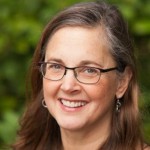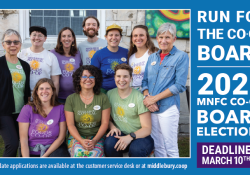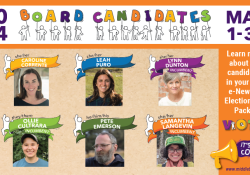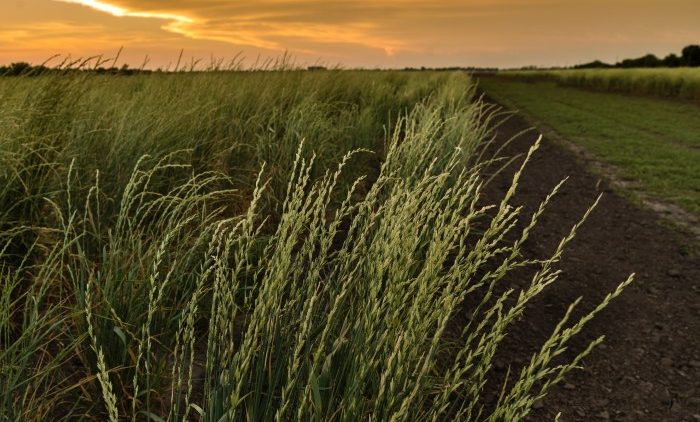
Project exploring perennial agriculture and education takes root in Middlebury
Since 2018 New Perennials has been in residence at Middlebury College. The College and the surrounding Champlain Valley of Vermont serve as a classroom, laboratory, seed bank, and library to explore perennial thinking and action. In addition to developing courses, scholarly and curricular materials, the Middlebury Hub features engagement with community partners, crop testing at the College farm, an annual conference, and engagement with departments and programs across campus. Students and perennial practitioners come together to grow and root a network of perennial and diverse thinkers and doers.
The College hosts New Perennials Director and scholar in residence Bill Vitek, a philosopher, educator, and long-time collaborator with Wes Jackson and The Land Institute. Bill lives in Middlebury with his family, just a short walk to the Coop. See below for a Q/A to get to know Bill who is new to our community having moved here in the summer of 2019 from Potsdam, New York, where he was on the faculty and was chair of the Department of Humanities and Social Sciences at Clarkson University.
Marc Lapin of Cornwall and I are both a part of the New Perennials team at Middlebury. Since 2018 each fall the three of us co-teach a community-connected learning course in the Environmental Studies Program called The Perennial Turn in Ag and Culture. Glenn and the Coop stepped up to be part of our experiment as one of our first community partners in the fall of 2018. Glenn worked with two students to explore what perennial means and how it applies to the Coop representing the food/ag sphere in the Champlain Valley.
Bill was delighted to help me introduce his work with New Perennials to Coop members and non-members.
Bill, we’ve been working together for nearly two and a half years. I am so grateful you’ve put down roots here and brought this timely work to Middlebury and Vermont, and to be a part of it! Tell us about your new role in residence at Middlebury?
Thanks, Nadine. What a wonderful community my family and I have moved to! And just up the street from the Co-op, a central criterion for my wife Maria while we were house hunting in 2019. It was a momentous and anxiety-filled decision to leave a job and community we loved for thirty-two years and start over again. But the opportunity to explore perennial thinking and action in and beyond agriculture, and to do it in the Champlain Valley with such talented students and socially progressive community partners, felt like the overwhelmingly right thing to do. I spend my days writing and teaching, learning more about the region, and finding connections with folks and organizations who are already working to grow more just, resilient, and joyful communities and regions.
What is Kernza and what makes it Perennial – and what do you mean by “Perennial” culture? Will we be able to buy Kernza flour at the Coop?
Kernza® is the trademark name for the grain of an intermediate wheatgrass (Thinopyrum intermedium) being developed at The Land Institute. Perennial plants can live for more than one year, and sometimes for thousands of years (think of ancient trees). Kernza roots overwinter and can grow to ten feet, and those roots sequester carbon while providing grain for human consumption. The work of The Land Institute and its more than 60 research partners spanning the globe is to replace the major grain crops (wheat, rice, corn)–all of which are annual grasses requiring annual tillage, weed suppression, irrigation, and lots of labor or fossil-powered traction–with perennial varieties and diverse mixtures of plants that mimic grassland ecosystems. It’s a slow, challenging process of breeding and testing varieties, but progress has accelerated in the past decade. Kernza flour and products made with Kernza are increasingly available to retailers and consumers. Visit https://kernza.org/ for more information.
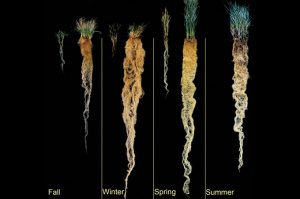
Perennial culture, in a few words, is the collection of ancient wisdom and rhythms that were lost or intentionally destroyed as large state societies–beginning 5,000 years ago around the globe, and powered by the surplus of annual agricultural practices–overwhelmed the landscape and the multitude of cultures, languages, and farming practices. A central feature of the New Perennials project that brought me to Middlebury is to explore how a return to perennial and diverse agriculture may awaken those ancient practices, and create new ones as well.
Can you tell us about Wes Jackson and The Land Institute in just a few sentences?
I met Wes in 1990 when I invited Wendell Berry to Clarkson University to give a lecture and he turned me down. He suggested I contact Wes. It was the best rejection letter I ever received! Wes has a way of bringing people into his life’s work who span the professions and academic disciplines. I’m a philosopher and he was trained as a plant geneticist. But he’d rather talk about Dante and Darwin Alexander Pope and Alfred North Whitehead than the latest journal articles on plant breeding (though he can do that, too!). Over the years Wes and I edited two books together (he likes to say that I did all the heavy lifting and he gets half the credit; which is true!) and tried to imagine what a curriculum would look like that didn’t assume that humans were at the top and in control, and that didn’t rundown the Earth’s web of life or impoverish billions for the advantage of a few. In 2018 we partnered with a few others and received generous financial support to find out. That brought me to Middlebury and to the work that I share with you, Nadine, and Marc Lapin, and a growing team of students, colleagues, and community members. I’m so grateful to Wendell, and Wes, and all of you.
What has surprised you the most about making the Champlain Valley home, especially for 8 months after you moved in COVID-19 really changed things up?
I like to joke these days, and I wish it were funnier, that one should not pull up well-established roots and try to put them down elsewhere during a pandemic. That said, my neighbors, the co-op, the town and, well, Vermont, have all been wonderfully welcoming to life-long New Yorkers who found it difficult to put those green license plates on their car, and who still–should I admit this?–still listen to North Country Public Radio. When cashier folks ask how your day is going they seem genuinely interested in your answer. And the pace of life is both more intense and laid back if that makes sense. I love the spontaneous conversations that begin on the sidewalks of Middlebury or at the hardware store. I’ve even found some wonderful jazz musicians to play music with–Ron Brown and Bear Irwin. We call ourselves Jazz Essentials and look forward to playing out again one of these days. (Bill has been a working jazz pianist for forty years.)
Did you pick your house location because you can walk to the Coop; how many days, hours, weeks did it take you to become a member?
As I mentioned above, my wife Maria had strong feelings about wanting to be in walking distance to the Coop. At an approximate distance of 900 feet, I guess you can say we are! We were members of our Coop in Potsdam, so there was no question about joining here in Middlebury. But the process says a lot about our whole experience of moving here. Maria and I were in town on one of our many house-hunting trips and stopped in the Coop to stock up on some things before we headed back to Potsdam. While in line we were asked if we were members, and we said no, but we planned to be once we moved, etc. We then decided to just join then and there. It took a few minutes and I apologized to the customer behind us for slowing down the line. She said “Take your time. Joining the Coop is the best thing you’re going to do today.” We said we were planning to relocate, etc., and she told us her story about moving to Middlebury a decade earlier, how it was the best decision she’s ever made, and “welcome!” That experience just about sums it up.
To learn more about the work of New Perennials at Middlebury College, check out our new and emerging website, new perennials.org, where you’ll find a form to sign up to be put on our mailing list. You can learn more about Bill here.
Are Perennial Grains Organic?
Depends on who plants them and how they manage their soils, pest management, etc. The point, I think, is that perennial grains are more easily organic due to fewer needs for weed control, etc.
“No pesticides are approved for use on Kernza. The largest market for Kernza is as a certified organic crop. According to Peters, many growers are using Kernza as a transitional crop to organic.”
https://non-gmoreport.com/articles/will-kernza-perennial-grain-lead-an-agricultural-revolution/
Nadine Canter Barnicle is a Middlebury Natural Foods Co-op Board Member
